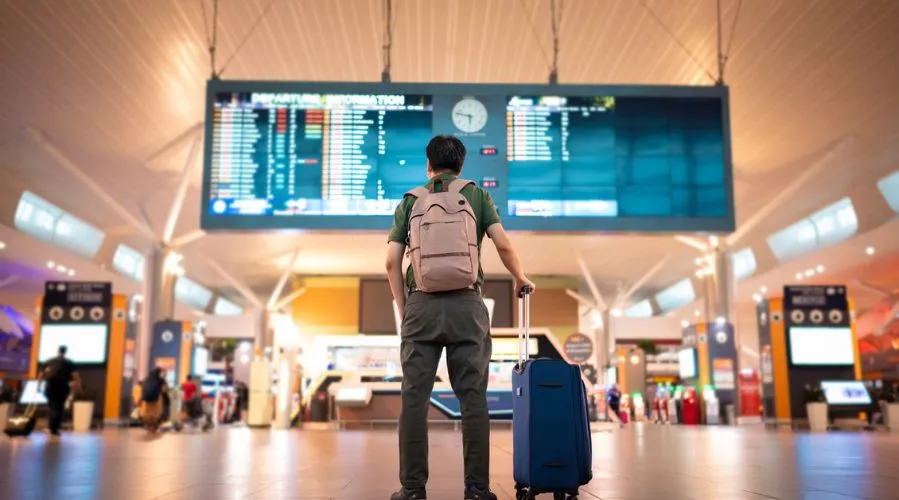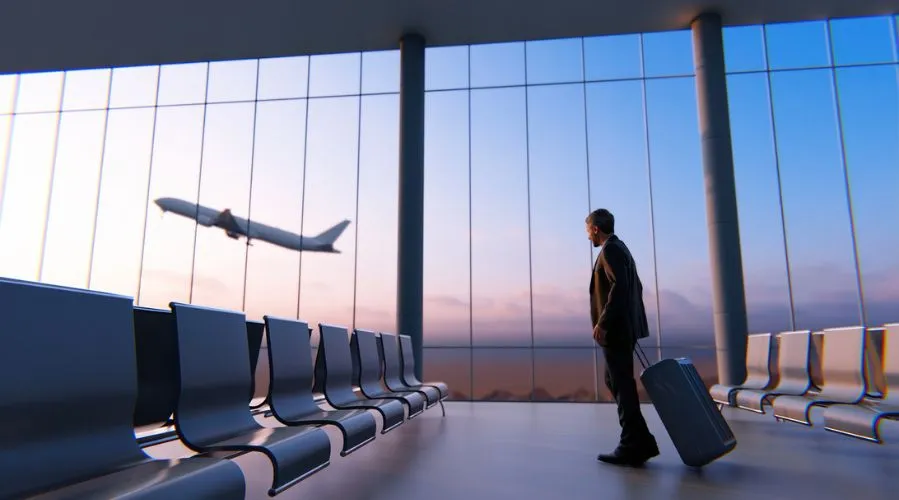Written by Axel Strauss
DATE: 01/04/2024
Located on the east coast of the Baltic Sea — and literally right in the center of Europe — Lithuania is not as well-known as some of its bigger EU neighbors. However, its popularity has been steadily growing in recent years. And with millions of international visitors annually, the recognition "The Land of Amber" has been gaining as of late is well-deserved. First, there’s the enchanting baroque and yet modern maze of beauty that is its capital city Vilnius. And its over 3,000 sparkling natural lakes. Its dozens of pristine national parks and lush wildlife. Its diverse history, heritage, and culture. Its intriguing, warm, and welcoming people. And much, much more.
In short, this hidden-in-plain-sight Baltic gem has plenty to discover for any type of traveler. And if you’d like to experience some of its countless wonders firsthand, you might first need a Schengen visa. In which case, AXA can help.
- Do I need a visa to visit Lithuania?
- How do I apply for a visa to go to Lithuania?
- How much does a Schengen visa for Lithuania cost?
- What about ETIAS and EES?
- How can AXA help?
- How to apply for a Schengen visa for other countries
Do I need a visa to visit Lithuania?
That depends. And that’s because Lithuania is both a member of the EU and one of 27 countries currently in the Schengen Zone. And that means that most of its millions of visitors — depending on where they’re coming from — need to apply for a Schengen Visa to enter its borders.
Which travelers don’t need a Schengen visa to come to Lithuania (for stays of less than 90 days)?
You do not need a Schengen Visa to enter the Republic of Lithuania if you happen to be:
- A national of the Schengen area or one (or more) of the European Union member countries.
- Already have a visa issued by Lithuania (or one of the member countries of the Schengen area) — and so long as your stay in the Schengen area does not exceed 90 days per period of 180 days.
- Are a citizen* of non-EU countries and territories that have signed visa exemption agreements with the EU . These include Australia, Brazil, Canada, Hong Kong, Japan, Macao, Mexico, Taiwan, the U.K., and the U.S., and roughly 50 more.
*If you’re a national of one or any of the countries above, you can travel to Lithuania visa-free for short stays. You’re only required to present a biometric passport (issued no more than 10 years prior to and valid for at least 90 days after the planned date of departure from the Schengen zone).
Which travelers are required to apply for a visa to Lithuania?
Meanwhile, you will need a Schengen visa for Lithuania if your home country has not signed a visa waiver agreement with the EU. And this includes all African countries, most Asian and the Middle Eastern ones, China, India, Russia, and nearly a hundred more.
PRO-TIP 1: You can see the full lists of both countries that are exempt and that need a visa courtesy of the European Commission.
PRO-TIP 2: AXA can tell you whether you need a Schengen visa in no time too.
PRO-TIP 3: And we can also tell you which European countries you don’t need a Schengen visa for.
What type of visa do I need to visit Lithuania?
The visa you want will depend on why you’re going to Lithuania. There are four basic types of Schengen Visa: business, work, student, and short-stay.
The most common Schengen visa to choose is the short-stay (aka Type C or “tourist”) visa. It allows travel to Lithuania (and to/between all 27 Schengen countries) for up to 90 days in any 180-day period.
To stay longer, you’ll need a national Lithuanian (or Type D) visa.
A Type A (aka “airport transit”) visa, meanwhile, allows citizens of non-Schengen States to wait for a connecting flight and/or transit through Lithuania’s airports (or those of any other Schengen state).
And you should opt for a multiple-entry visa if you’re planning more than one trip.
PRO-TIPS 4: AXA can help you understand which visa best suits your needs too.
How do I apply for a visa to go to Lithuania?
Once you know which visa you want, you’ll need the proper paperwork, patience, and to attend an interview (or two). Your actual visa application process will depend on a number of different factors. But here’s a general breakdown of what to expect:
What documents are required to obtain a Schengen visa for Lithuania?
To apply, you should have (at the very least):
- Your passport (issued within the last 10 years, with a validity of more than 3 months after the planned date of exit from the Schengen area)
- A Schengen visa application form (duly completed and signed).
- Two recent passport photos
- Your itinerary
- Travel insurance (NOTE: Travel insurance is mandatory and must meet several criteria in order to be accepted with your visa application — but more on that below)
- Proof of sufficient funds* (if applicable)
- Proof of the purpose of the trip such as a letter of invitation (if applicable)
- Your residence permit and/or resident card (if applicable)
- Proof of accommodation (if applicable)
- Proof of socio-economic and professional stability (if applicable)
- For minors — certified parental or guardian authorization
And if you’re traveling for business, you might also need:
- a schedule of your stay with your business contacts and/or a signed letter of invitation from a Lithuanian company (if applicable)
- documentation linked to your business operations (if applicable)
How much money do I need to come to Lithuania?
While Lithuania’s official immigration website does state that you will need to provide proof of “sufficient financial means” to cover your stay in Lithuania, it doesn't explicitly state a specific amount for said sufficient funds.
But according to the internet at large, you’re looking at anywhere between €150 for every month of your stay (at least) to €50 a day (at least). So we suggest you double-check with an actual human once you have your visa appointment.
When and where should I apply for my Schengen visa to Lithuania?
Your visa application should be submitted no earlier than 6 months and no later than 2 to 3 weeks before your departure date. And while you can start the process online, you will eventually need to come in in person — with all the paperwork above — for biometric data collection.
And depending on where you are and where you’re from originally, you generally have two main options for applying for a Schengen visa to Lithuania:
The traditional method is via a Lithuanian Embassy or Consulate. Fortunately, the Lithuanian Ministry of Foreign Affairs provides a comprehensive,easy-to-use map of Lithuanian embassies and consulates worldwide — complete with contact information,websites, and so on. They can also guide you through the general application process and help you schedule an appointment.
Your other option is through an authorized visa application center. Because Lithuania, like many other Schengen countries, also outsources some visa applications through the company VFS Global. And you can find a VFS Global center closest to you by visiting their website in the U.S., for example, as well as dozens of other countries (just click around a bit.).
PRO-TIP 5: The Lithuanian Migration Department provides detailed information on visa requirements. And AXA also always strives to bring you the latest info regarding Schengen Visa requirements for travelers near and far. However, you should always double-check with the official sources above — as well as the European Commission’s official visa website — to make sure you don’t miss anything.
*HOPEFUL NOTE: And while to apply for your visa you will need to be physically present at some point, the EU does plan to bring the whole Schengen Visa application process online eventually — including for Lithuania. However, the exact date the change will take place has yet to be announced. Our fingers remain crossed…
How much does a Schengen visa for Lithuania cost?
The costs of the Schengen Visa, meanwhile, are universal. The standard fee for one adult to come to Lithuania (or anywhere else in the Schengen) is therefore €80.
If you’re between the ages of six and twelve, it’s €40.
And children under the age of six can get a Schengen visa for free.
IMPORTANT NOTE: In early 2024, the European Commission announced that it had “assessed the need to revise the visa fee amounts and concluded that they should be increased.” The proposed increase would mean that Schengen visas universally — cost 90€ (i.e., a 10€ increase) for adults and 45€ (i.e., a 5€ increase) for children. However, there is no set date for the increase as of yet.
PRO-TIP 5: AXA can tell you all about that and a few other key changes Europe has planned for 2024.
What about ETIAS and EES?
ETIAS — which is short for “European Information and Authorization System” — is another thing the EU is working on in 2024 (and for a number of years before that). It’s supposed to be a new, mostly digital system of requirements for entering Europe designed to make travel both safer and easier. However, it’s taking some time to get off the ground and — according to the EU’s official website — is most recently set to go into effect in “mid-2025.”
And for ETIAS to go into, the EU first needs to implement EES — which is short for “Entry/Exit System.” EES is intended to replace traditional passport stamping, and the EU says they’re expecting to have that running “starting in the second half of 2024.”
In other words, while the EU does have their acronyms in order and ready to go, the systems themselves have yet to affect travel to Lithuania (or the rest of the Schengen) in any way. So AXA recommends you check back with the official source above for the latest developments. And, like us, hope for the best.
How can AXA help?
How we can truly help, meanwhile, is by doing what we do best — and that is ensuring that millions of visitors to Lithuania have a safe and stress-free trip (with almost no wait times whatsoever, mind you). How? By providing you with affordable, top-quality, instant Schengen Travel insurance.
Firstly, because travel insurance is a mandatory requirement to be granted a Schengen visa — to Lithuania or anywhere else. And it’s also mandatory that your plan meet the following criteria:
- Guarantees minimum coverage for at least €30,000 in medical expenses
- Covers any expenses that might arise in connection with repatriation for medical reasons
- Covers you in all member states of the Schengen Area (not just Lithuania)
- Covers you during the entire duration of your trip and stay in the Schengen Zone.
And all three AXA plans — Basic, Essential, and Annual — meet these requirements.
Not only that, but if your Schengen visa is denied, AXA’s plans are refundable in most cases. We’ll only ask that you provide the appropriate documentation (i.e., an official explanation as to why your visa was refused by the relevant embassy, consulate, or visa application center).
But even if you don’t need a visa, travel insurance while visiting this Baltic gem is never a bad call. And here are just a few more reasons to choose AXA:
- Our plans also cover you not just in Lithuania but in all 27 Schengen territories (and beyond).
- Getting an AXA travel insurance plan, meanwhile, is quick and easy.
- Your plan can be purchased online in just a few minutes.
- Our travel insurance certificate — accepted by all Shcengen embassies, consulates, and VFS Global centers worldwide — can then be downloaded (and printed) online instantly.
- Our plans have no age restrictions.
- And plenty more…
So learn more about and compare our 3 comprehensive plans today. The right AXA plan is sure to make your trip to the lesser-known heart of Europe that much more worry-free.
How to apply for a Schengen visa for other countries
Meanwhile, if you’re hoping to apply to some (or any) of Lithuania's more and/or less popular Schengen neighbors, AXA has comprehensive step-by-step guides for all 26 of them too:
Schengen countries
RELATED ARTICLES:
- How to fill out a Schengen visa application form
- How to track your Schengen visa application
- How long is a Schengen visa valid for?
- How to extend a Schengen visa
- How to choose the best Schengen travel insurance
- How safe is Europe to visit?
- Easiest countries to obtain a Schengen visa from
FAQ
How long does it take to process a Schengen visa?
In general, the wait time is at least 15 days. However, in some cases, embassies can take between a month or two to process a visa. It will depend on your particular situation.
Can I travel to Lithuania if I have obtained a Schengen Visa from another country?
Yes. A Schengen Visa allows you to travel to and throughout all 27 Schengen countries — no matter which country you got it from. However, you must apply with the country in which you plan to spend the most time.
What should I do if my visa is refused?
If your visa is rejected, you usually have two options — apply again, or appeal. You can learn more in the EU’s Article 32(3) of the Visa Code of the Schengen Agreement. And the outcome of your appeal will ultimately depend on the Lithuanian authorities.
Are there any COVID restrictions for entering Lithuania?
No. All travel restrictions implemented to control the spread of COVID-19 have been lifted in the EU and the Schengen as of 2022.
Can I work or study in Lithuania with a tourist visa?
No. While the tourist (or Type C) allows visitors to enter the Shcengen for a short business trip, a holiday, and/or to visit family members, it cannot be converted into a work or study permit. But AXA can tell you all you need to know about that.
What happens if I overstay my Schengen visa?
The consequences of overstaying your visa range from paying a fine, deportation, jail time, or even being banned from the country. And AXA is happy to help you avoid all of them as well.
Can my Lithuania visa be extended?
Yes, but only in exceptional cases. AXA can tell you more about extending your visa too.
AXA already looks after millions of people around the world
With our travel insurance we can take great care of you too
AXA Schengen's Travel Insurances

AXA Schengen Basic
AXA Schengen Basic is perfect to obtain your Schengen visa. This travel insurance meets all the requirements demanded, covers you in all the countries of the Schengen Area as well as 4 European microstates (Andorra, Vatican City, Monaco and San Marino).

AXA Schengen Essential
AXA Essential is perfect to obtain your Schengen visa. It provides coverage in all the Schengen countries + the European microstates + all the EU countries (including UK, Cyprus and the Republic of Ireland). And you get additional guarantees compared to AXA Schengen Basic.

AXA Schengen Annual
AXA Annual is perfect to obtain your Schengen visa. This annual travel insurance is ideal for those who often travel to Europe as well as multiple-entry Schengen visa holders. You get the same guarantees as AXA Schengen Annual for different countries during 90 days.


